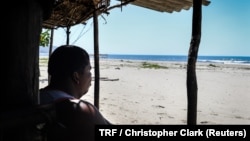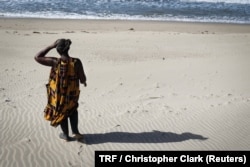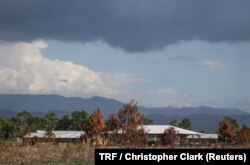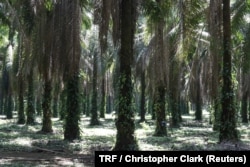Six years ago, the Honduran settlement of Vallecito was all but abandoned. Now it is a thriving community for the Garifuna minority and the heartland of their fight against what they see as a concerted effort to drive them from their ancestral lands.
About 100 people inhabit Vallecito, a cluster of mud-brick bungalows grouped around a pair of imposing temples with tall thatched roofs. It now has a school and will soon launch its own community radio station.
Most have moved there in recent years as part of a concerted effort to reclaim Garifuna lands abandoned due to the threat of violence from drug cartels and encroachment by palm oil companies - among them Francisca Arreola.
"People came from Garifuna communities all over Honduras to protect this place," said the 59-year-old, who moved from a nearby town in 2012.
"This land belonged to our ancestors. We cannot let anyone take it from us," she told the Thomson Reuters Foundation.
The Garifuna are descended from African slaves and indigenous groups and have inhabited Vallecito on the Caribbean coast of north east Honduras since the late 18th century.
Their culture combines Caribbean fishing and farming traditions with a mixture of South American and African music, dance and spirituality, and appears on the United Nations' protected intangible cultural heritage list.
Communal land occupies a paramount role and is passed on via the maternal line.
'Heartland of Resistance'
Vallecito is one of the Garifunas' oldest ancestral sites on the mainland and they were awarded official title deeds to the 980 hectares that make up the area in 1997.
Nonetheless they have for many years faced harassment, intimidation and threats over the land, according to Amnesty International.
"There was a time when men would come in with guns and try to drive us out almost daily," Arreola recalled as she stirred a large pot of beans on an open fire in Vallecito's communal kitchen. "But for now, things are quiet."
Activist Miriam Miranda said the Vallecito community had become the "heartland of Garifuna resistance" in Honduras, which Global Witness has called the world's deadliest country for environmental activists.
Miranda, general coordinator of the Black Fraternal Organization of Honduras (OFRANEH), said there were persistent threats to the community's existence. In April, a suspected arson attack almost razed the settlement to the ground.
Vallecito falls within a tract of land earmarked as a Employment and Economic Development Zone, or ZEDE, a state initiative to attract foreign investors to Honduras through the creation of autonomous economic enclaves.
These are predominantly premised on large-scale energy, mining and tourism projects and OFRANEH says they will encompass more than 20 of the 47 Garifuna communities dotted along Honduras's Caribbean coast.
"Never before have there been so many threats to the cultural subsistence of the Garifuna," said Miranda.
'A Story of Threats'
The Garifuna village of Triunfo de la Cruz about 250 km (150 miles) west of Vallecito is characterized by ramshackle rows of pastel-colored clapboard houses that spill onto the white sand of Tela Bay, a burgeoning ecotourism hotspot.
Tela Bay is home to a flagship state-subsidized tourism mega-project called the Indura Beach and Golf Resort.
In 2014, police and military units tried to forcibly evict 157 Garifuna families from the surrounding area as part of a plan to expand the resort, according to a Global Witness report.
"Beneath the perfect travel brochure surface [of Indura] is a story of threats, harassment and human rights abuse," the Global Witness report said.
The following year, the Inter-American Court of Human Rights found the state of Honduras responsible for the violation of collective ownership rights in Triunfo de la Cruz after the local municipal government sold Garifuna land to developers.
The court found the Honduran government had violated the Garifunas' rights to "Free, Prior, and Informed Consent" - a key tenet of the U.N. Declaration on the Rights of Indigenous Peoples.
Presidential spokesman Ebal Diaz failed to respond to multiple requests for comment.
Indura declined to comment, but in a press release issued in response to the Global Witness report, the resort denied any attempt to force out the Garifuna.
"The company has all the permits required by law for the development of this tourist project," it said. "Indura Beach and Golf Resort, since the first phase of the project, has sought to work together with the (surrounding) Garifuna communities."
Political Will
Christopher Loperena, an anthropologist who has studied the issue, called the court's judgment a "big victory for these communities in terms of gaining international recognition of their land rights."
But he said there did not appear to be the political will to carry out the recommended reparations.
Lariza Calix, a spokeswoman for the Tela Municipality, said her department was awaiting instructions from central government on how to proceed, but that "at this point we have not had any communication in this respect."
Meanwhile the Vallecito community are focusing on conservation, with an organic vegetable garden, coconut plantation and ambitions to grow medicinal plants as well as plots of rice, maize and beans.
"Our aim is to become totally self-sufficient," said Henry Norales, who moved from the capital Tegucigalpa to be head agricultural engineer for OFRANEH.
"This is what I hope to leave for the next generation, so they can continue to preserve our culture."



